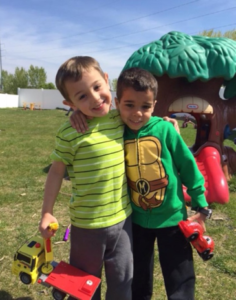 A child is one of the most important members of society. There is no comparison when valuing life. For parents, one of the most difficult situations they are faced with is to entrust their child, whether an infant, toddler, or school aged child, into a stranger’s care. Unfortunately, both parents need to work, or the child comes from a split family, and sacrifices must be made, and daycare becomes essential. Premier Academy understands the sacrifices that parents make for their children and provides premium childcare that is not just babysitting, but, an environment to stimulate the child to learn and explore the world through their own eyes.
A child is one of the most important members of society. There is no comparison when valuing life. For parents, one of the most difficult situations they are faced with is to entrust their child, whether an infant, toddler, or school aged child, into a stranger’s care. Unfortunately, both parents need to work, or the child comes from a split family, and sacrifices must be made, and daycare becomes essential. Premier Academy understands the sacrifices that parents make for their children and provides premium childcare that is not just babysitting, but, an environment to stimulate the child to learn and explore the world through their own eyes.
Today, the childcare industry is growing and being promoted in many different communities as per demand. It is not all providers, however, that provide the best environment for children. It is essential that the daycare have the experience and education, as well as, credentials to ensure the child’s health, happiness, safety and growth. The foundation of childhood is one of the most important foundations in life. It is essential that the child is properly cared for.Premier Academy makes sure that the fun element, which makes the wonderful world of a child so special, stays, and is reinforced, daily.
Premier Academy offers different packages:
- Infants’ Growth Package
- Toddlers’ Care Package
- Pre-school children care
- Pre-K children care
- School age children learning program
It is difficult for parents to accept being away from their child, and put their child in a stranger’s hands. There are many things that must be taken into consideration. Affordable childcare centers in Omaha Nebraska is something that many parents search for. This is not enough. Parent also must seek childcare centers that are accredited and approved by the Department of Health and Human Services (DHHS), Division of Public Health, State of Nebraska. Centers listed in the DHHS Childcare Roster are the best options for your infant. The DHHS keeps a close eye on the childcare centers on a regular basis with cancelling registration and closing of centers not complying with the DHHS guidelines.
For children, it is essential to have a care giver that is well-trained and loving. The child should be in an environment with children their own age, where the parents can stop in, just to tell the child they love them, at any time throughout the day, and one that is stimulating and educational.
Daycare has to provide a service that supports and cares for the child and offers the parents security that their child is being nurtured, educated and loved. The center should bring out the child’s creativity and self-esteem. The child should receive a quality of life that nurtures his foundation for his academic years ahead. When parents seek daycare for their children, it is essential that they seek a daycare that specializes in services for infant, toddler, preschool, pre-K and school aged children. The daycare is often a place where a child starts young, and grows throughout the years, and you want a daycare that will be there for you throughout the years.

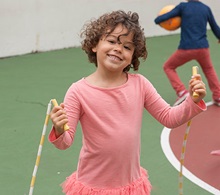 There are two words that can send your summer spirit soaring: “I’m bored!” Your child has suddenly gone from an action-packed school year to the carefree days of summer. As much as you are both happy to be done with homework for a while, all of this freedom can be problematic. You want to chill out with some lemonade yet your kids expect you to be the peppy cruise director. But it is possible for everyone to feel the joy of the season, make wonderful memories and be truly happy together. No more saying, “What can we do this summer?”
There are two words that can send your summer spirit soaring: “I’m bored!” Your child has suddenly gone from an action-packed school year to the carefree days of summer. As much as you are both happy to be done with homework for a while, all of this freedom can be problematic. You want to chill out with some lemonade yet your kids expect you to be the peppy cruise director. But it is possible for everyone to feel the joy of the season, make wonderful memories and be truly happy together. No more saying, “What can we do this summer?” Did you know that most camp planning takes place in early winter and spring? Just when you were getting over the holiday stress and still bundled in your Snuggie, you need to find the place for your child to get out of the house — um, we mean thrive — this summer with affordable summer programs in Omaha, Nebraska.
Did you know that most camp planning takes place in early winter and spring? Just when you were getting over the holiday stress and still bundled in your Snuggie, you need to find the place for your child to get out of the house — um, we mean thrive — this summer with affordable summer programs in Omaha, Nebraska. Family vacations are great for bonding with loved ones as you get away from your normal routines. But a family vacation can sometimes feel like no vacation at all for parents chasing after kids. Parents need time to themselves, and not just for romance, but to relax, reconnect and revisit what brought them together.
Family vacations are great for bonding with loved ones as you get away from your normal routines. But a family vacation can sometimes feel like no vacation at all for parents chasing after kids. Parents need time to themselves, and not just for romance, but to relax, reconnect and revisit what brought them together.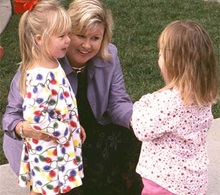 Did you know that most camp planning takes place in early winter and spring? Just when you were getting over the holiday stress and still bundled in your Snuggie, you need to find the place for your child to get out of the house — um, we mean thrive — this summer.
Did you know that most camp planning takes place in early winter and spring? Just when you were getting over the holiday stress and still bundled in your Snuggie, you need to find the place for your child to get out of the house — um, we mean thrive — this summer. Remember when you were a kid and summer seemed endless — in a good way?
Remember when you were a kid and summer seemed endless — in a good way?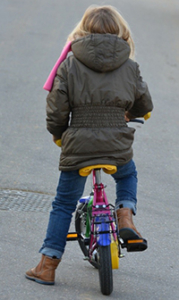 There are many reasons kids should play outside, from expressing creativity to running freely to making messes without worrying about dirtying the house. In addition to these fun reasons, there are also many health benefits that make outdoor play great for children.
There are many reasons kids should play outside, from expressing creativity to running freely to making messes without worrying about dirtying the house. In addition to these fun reasons, there are also many health benefits that make outdoor play great for children. Getting your child to talk about their day can be challenging. But it’s important to talk with your kids about their day, every day, to stay connected and offer encouragement.
Getting your child to talk about their day can be challenging. But it’s important to talk with your kids about their day, every day, to stay connected and offer encouragement. We’ve all been there. And many of us still are. No matter how many times we swore (to ourselves and everyone around us) that our kids will be different, that our kids will eat everything, the inevitable happened. We raised picky eaters. Gone are the fantasies of eating family meals of chicken salad and thai curry. Now we get excited if they eat a bite of broccoli alongside a cheesy bowl of macaroni. Chicken nuggets are their own food group, along with buttered pasta and fish.
We’ve all been there. And many of us still are. No matter how many times we swore (to ourselves and everyone around us) that our kids will be different, that our kids will eat everything, the inevitable happened. We raised picky eaters. Gone are the fantasies of eating family meals of chicken salad and thai curry. Now we get excited if they eat a bite of broccoli alongside a cheesy bowl of macaroni. Chicken nuggets are their own food group, along with buttered pasta and fish.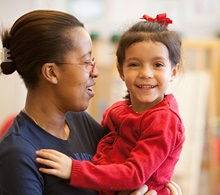 There are many factors to consider when searching for a daycare for your child. Safety should always be at the top of your list. There are safety standards for things like licensing, child proofing, staff-to-child ratios, indoor and outdoor spaces, staff behavior, behavior policies, etc.
There are many factors to consider when searching for a daycare for your child. Safety should always be at the top of your list. There are safety standards for things like licensing, child proofing, staff-to-child ratios, indoor and outdoor spaces, staff behavior, behavior policies, etc.